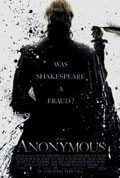
Directed by
Roland Emmerich
130 minutes
Rated M
Reviewed by
Emma Flanagan

Anonymous
Synopsis: Childless Queen Elizabeth I (Vanessa Redgrave) is under pressure from her most trusted advisers, the Cecils, to name King James of Scotland as the successor to her throne. But other nobles want an Englishman on the throne. In secret, the Earl of Oxford (Rhys Ifans) writes a play, ridiculing the Cecils through a thinly veiled caricature of ruthless Richard III, which the audience – particularly the mob element - easily recognises. Will this political ploy set off a revolt against the Cecils in favour of the Earl of Essex, thus showing that the pen is mightier than the sword?
Anonymous opens with a current-day narrator (a delightful Derek Jacobi) on stage opening a Broadway production. How, he asks the theatre audience, could William Shakespeare, a man who never set foot on foreign soil, have written so convincingly about places he had never seen? Why is there not a single manuscript in Shakespeare's hand? Cue a conspiracy theory...
Told in two separate time periods 30 years apart, the switching between decades makes for confusing viewing at times, a little more time spent on crisper editing would have made the film easier to follow, as would a shortening of its length. Anonymous is, nonetheless, a success, and largely due to the screenplay. While he has as his subject England’s greatest-ever playwright, which makes sprinkling recognisable quotes throughout the film easy, American John Orloff has woven a tale of the battle for dynastic succession within a flight of fancy about Shakespeare being in fact not the man we all take him to be, the greatest author in the English language but a beard for Edward de Vere, the 17th Earl of Oxford (Rhys Ifans).
Personally, I do not subscribe to the idea that Good Queen Bess was anything but the Virgin Queen and not the sexually active creature depicted here. Spending time in the Tower of London while your sister burns your fellow non-Catholics at the stake, and having had your father send your mother to the block in a previous decade, are but two reminders of how dangerous was the 16th century for any monarch, real or merely aspiring. My argument is this; the single riskiest thing a female monarch could do in those days was to give birth, so why would she have multiple times, let alone with different fathers?. Having her step-mother die after childbirth would be another experience which would have focused Elizabeth’s attention on the prime aim in life – survival.
There will be plenty of traditionalists who will squeal in horror at the idea of QEI being anything but virginal, as they would also have done with Shekhar Kapur’s Elizabeth (my choice for QEI is the superlative Glenda Jackson in the 1971 BBC production Elizabeth R). But if you go with the notion of a non-chaste monarch (which was certainly the case for male equivalents of the time), the story, well-balanced between action, intrigue and melodrama, using accessible language with a flavour of historical accuracy, draws you in. What Anonymous shows is the importance of good writing craftsmanship, that most anonymous of contributions to film-making, the ability to persuade audiences to suspend disbelief and go with the story.
There are fine performances throughout, with Ifans and David Thewlis as William Cecil standing out and including Australian Xavier Samuel as the Earl of Southampton, whose life is linked with Oxford for the most secret of reasons. Edward Hogg impresses as unctuous Robert Cecil, while Rafe Spall steals scenes as Shakespeare the illiterate actor who, through a bit of luck and a lot of rat cunning, gets his name put to the earl’s work.
See this film, and if you can’t accept the premise, enjoy it for the acting, music, fabulous production design and sense of danger at every turn.
And by the bye - the idea of a secret writer itself was one claimed by Thomas Looney in the 1920s. I prefer the idea that any ‘real Shakespeare’ was actually a 16th Century diplomat, Sir Henry Neville.

Want more about this film?


Want something different?




